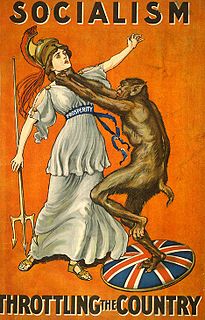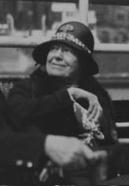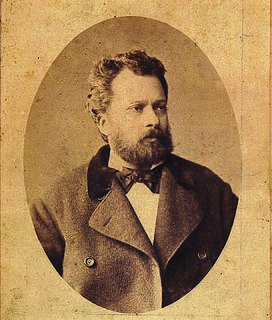Related Research Articles
Distributism is an economic theory asserting that the world's productive assets should be widely owned rather than concentrated. Developed in the late 19th and early 20th centuries, distributism was based upon the principles of Catholic social teaching, especially the teachings of Pope Leo XIII in his encyclical Rerum novarum (1891) and Pope Pius XI in Quadragesimo anno (1931).

A government is the system or group of people governing an organized community, generally a state.

George Bernard Shaw 26 July 1856 – 2 November 1950), known at his insistence simply as Bernard Shaw, was an Irish playwright, critic, polemicist and political activist. His influence on Western theatre, culture and politics extended from the 1880s to his death and beyond. He wrote more than sixty plays, including major works such as Man and Superman (1902), Pygmalion (1912) and Saint Joan (1923). With a range incorporating both contemporary satire and historical allegory, Shaw became the leading dramatist of his generation, and in 1925 was awarded the Nobel Prize in Literature.
Oligarchy is a form of power structure in which power rests with a small number of people. These people may or may not be distinguished by one or several characteristics, such as nobility, fame, wealth, education, or corporate, religious, political, or military control.
Politics is the set of activities that are associated with making decisions in groups, or other forms of power relations between individuals, such as the distribution of resources or status. The branch of social science that studies politics and government is referred to as political science.
A plutocracy or plutarchy is a society that is ruled or controlled by people of great wealth or income. The first known use of the term in English dates from 1631. Unlike most political systems, plutocracy is not rooted in any established political philosophy.

Right-wing politics supports the view that certain social orders and hierarchies are inevitable, natural, normal, or desirable, typically supporting this position on the basis of natural law, economics, or tradition. Hierarchy and inequality may be seen as natural results of traditional social differences or competition in market economies.
In economics and industrial design, planned obsolescence is a policy of planning or designing a product with an artificially limited useful life or a purposely frail design, so that it becomes obsolete after a certain pre-determined period of time upon which it decrementally functions or suddenly ceases to function, or might be perceived as unfashionable. The rationale behind this strategy is to generate long-term sales volume by reducing the time between repeat purchases. It is the deliberate shortening of a lifespan of a product to force people to purchase functional replacements.

The Jacobite succession is the line through which Jacobites believed that the crowns of England, Scotland, and Ireland should have descended, applying primogeniture, since the deposition of James II and VII in 1688 and his death in 1701. It is in opposition to the line of succession to the British throne in law since that time.

Bardolatry is excessive admiration of William Shakespeare. Shakespeare has been known as "the Bard" since the eighteenth century. One who idolizes Shakespeare is known as a bardolator. The term bardolatry, derived from Shakespeare's sobriquet "the Bard of Avon" and the Greek word latria "worship", was coined by George Bernard Shaw in the preface to his collection Three Plays for Puritans published in 1901. Shaw professed to dislike Shakespeare as a thinker and philosopher because Shaw believed that Shakespeare did not engage with social problems as Shaw did in his own plays.

The Apple Cart: A Political Extravaganza is a 1928 play by George Bernard Shaw. It is a satirical comedy about several political philosophies which are expounded by the characters, often in lengthy monologues. The plot follows the fictional English King Magnus as he spars with, and ultimately outwits, Prime Minister Proteus and his cabinet, who seek to strip the monarchy of its remaining political influence. Magnus opposes the corporation "Breakages, Limited", which controls politicians and impedes technical progress.
The exploration of politics in science fiction is arguably older than the identification of the genre. One of the earliest works of modern science fiction, H. G. Wells’ The Time Machine, is an extrapolation of the class structure of the United Kingdom of his time, an extreme form of social Darwinism; during tens of thousands of years, human beings have evolved into two different species based on their social class.

In political and sociological theory, the elite are a small group of powerful people who hold a disproportionate amount of wealth, privilege, political power, or skill in a society. Defined by the Cambridge Dictionary, the "elite" are "those people or organizations that are considered the best or most powerful compared to others of a similar type."
Post-capitalism is a state in which the economic systems of the world can no longer be described as forms of capitalism. Various individuals and political ideologies have speculated on what would define such a world. According to some classical Marxist and some social evolutionary theories, post-capitalist societies may come about as a result of spontaneous evolution as capitalism becomes obsolete. Others propose models to intentionally replace capitalism. The most notable among them are socialism, anarchism, and degrowth.
Consumer capitalism is a theoretical economic and social political condition in which consumer demand is manipulated in a deliberate and coordinated way on a very large scale through mass-marketing techniques, to the advantage of sellers.

Charlotte Frances Payne-Townshend was an Irish political activist in Britain. She was a member of the Fabian Society and was dedicated to the struggle for women's rights. She married the playwright George Bernard Shaw.
The capitalist state is the state, its functions and the form of organization it takes within capitalist socioeconomic systems. This concept is often used interchangeably with the concept of the modern state, though despite their common functions there are many recognized differences in sociological characteristics among capitalist states.

Lewis Gompertz was an English writer and inventor, and early animal rights and veganism advocate. He was a founding member, in June 1824, of the English Society for the Prevention of Cruelty to Animals; later the RSPCA. Gompertz was the younger brother of the mathematician and actuary Benjamin Gompertz and the poet Isaac Gompertz.

Namık Kemal was an Ottoman democrat, writer, intellectual, reformer, journalist, playwright, and political activist who was influential in the formation of the Young Ottomans and their struggle for governmental reform in the Ottoman Empire during the late Tanzimat period, which would lead to the First Constitutional Era in the Empire in 1876. Kemal was particularly significant for championing the notions of freedom and fatherland in his numerous plays and poems, and his works would have a powerful impact on the establishment of and future reform movements in Turkey, as well as other former Ottoman lands. He is often regarded as being instrumental in redefining Western concepts like natural rights and constitutional government.

The Festival Theatre, now known as Malvern Theatres, is a theatre complex on Grange Road in Malvern, Worcestershire, England. Malvern Theatres, housed in the Winter Gardens complex in the town centre of Great Malvern, has been a provincial centre for the arts since 1885. The theatre became known for its George Bernard Shaw productions in the 1930s and from 1977 onwards, along with the works of Edward Elgar. Up until 1965, 19 different plays of Shaw were produced at the Malvern Festival Theatre, and six premiered here, including The Apple Cart at the opening Malvern Festival in 1929, Geneva, a Fancied Page of History in Three Acts in August 1938 and In Good King Charles's Golden Days in August 1939.
References
- ↑ Bernard Shaw (1930). The apple cart: a political extravaganza . Constable and Company Ltd.
- ↑ Ruth Adam (1966). What Shaw Really Said. Macdonald & Company. p. 54.
- 1 2 Milton T. Wolf (1 January 1997). Shaw and Science Fiction. Penn State Press. p. 32. ISBN 0-271-01681-7.
- ↑ Heidi J. Holder; MaryAnn K. Crawford (2006). New Readings: Shaw at the Sesquicentennial. Pennsylvania State University Press. pp. 126–130. ISBN 978-0-271-02968-9.
- ↑ Bernard F. Dukore, "Playing Kings, Ultimatums, and Abdications: The Apple Cart and To Play The King", The Comparatist, Volume 40, October 2016 pp. 267-283, doi=10.1353/com.2016.0015
- ↑ The Spectator. F.C. Westley. July 1930. p. 946.
- 1 2 3 Gareth Griffith (2002). Socialism and Superior Brains: The Political Thought of George Bernard Shaw. Routledge. p. 255. ISBN 978-1-134-80294-4.
- 1 2 Text of The Apple Cart, Project Gutenberg Australia.
- ↑ Lacy, Rosalind (5 May 2011). "The Apple Cart". DC Theatre Scene.
- ↑ Jenny Stringer (1996). The Oxford Companion to Twentieth-century Literature in English . Oxford University Press. p. 26. ISBN 978-0-19-212271-1.
- ↑ James R. Kreuzer (1980). Modern Writings on Major English Authors. Ardent Media. p. 638. GGKEY:8U9F11432XF.
- ↑ Stephen M. Gill (1980). Political convictions of G. B. Shaw. Vesta. p. 47. ISBN 978-0-919806-88-7.
- ↑ The Shaw Review. Pennsylvania State University Press. 1977. p. 75.
- ↑ SENGUPTA, GAUTAM (April 2016). MYRIAD MINDED SHAW : PERSPECTIVES ON SHAVIAN DRAMA: POLITICS, WAR AND HISTORY. PHI Learning Pvt. Ltd. p. 32. ISBN 978-81-203-5211-7.
- ↑ Brian Winston (1986). "1. BREAKAGES LIMITED". Misunderstanding Media. Harvard University Press. pp. 15–. ISBN 978-0-674-57663-6.
- ↑ John T. Caldwell (2000). Theories of the New Media: A Historical Perspective. Athlone Press. pp. 77–. ISBN 978-0-485-30091-8.
- ↑ The Shaw Review. Pennsylvania State University Press. 1973. p. 79.
- ↑ Robert A. Heinlein (3 September 2013). The Man Who Sold the Moon and Orphans of the Sky. Baen. pp. 52–53. ISBN 978-1-62579-190-0.
- ↑ Donna Gibbs; Kerri-Lee Krause (2006). Cyberlines 2.0: Languages and Cultures of the Internet. James Nicholas Publishers. p. 20. ISBN 978-1-875408-42-9.